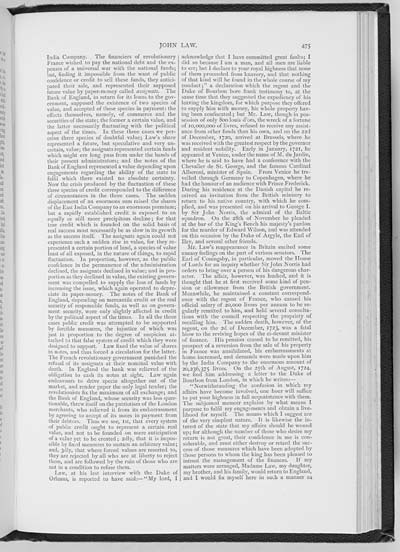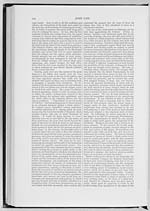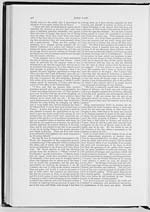475
India Company. The financiers of revolutionary I
France wished to pay the national debt and the ex-
penses of a universal war with the national funds;
but, finding it impossible from the want of public
confidence or credit to sell these funds, they antici-
pated their sale, and represented their supposed
future value by paper-money called assignats. The
Bank of England, in return for its loans to the gov-
ernment, supposed the existence of two species of
value, and accepted of these species in payment: the
effects themselves, namely, of commerce and the
securities of the state; the former a certain value, and
the latter necessarily fluctuating with the political
aspect of the times. In these three cases we per-
ceive three species of doubtful value; Law's share
represented a future, but speculative and very un-
certain, value; the assignats represented certain funds
which might ere long pass from under the hands of
their present administrators; and the notes of the
Bank of England represented a value depending upon
engagements regarding the ability of the state to
fulfil which there existed no absolute certainty.
Now the crisis produced by the fluctuation of these
three species of credit corresponded to the difference
of circumstances in the three cases. The sudden
displacement of an enormous sum raised the shares
of the East India Company to an enormous premium;
but a rapidly established credit is exposed to an
equally or still more precipitous decline; for that
true credit which is founded on the solid basis of
real success must necessarily be as slow in its growth
as the success itself. The assignats again could not
experience such a sudden rise in value, for they re-
presented a certain portion of land, a species of value
least of all exposed, in the nature of things, to rapid
fluctuation. In proportion, however, as the public
confidence in the permanence of the administration
declined, the assignats declined in value; and in pro-
portion as they declined in value, the existing govern-
ment was compelled to supply the loss of funds by
increasing the issue, which again operated to depre-
ciate its paper-money. The notes of the Bank of
England, depending on mercantile credit or the real
security of responsible funds, as well as on govern-
ment security, were only slightly affected in credit
by the political aspect of the times. In all the three
cases public credit was attempted to be supported
by forcible measures, the injustice of which was
just in proportion to the degree of suspicion at-
tached to that false system of credit which they were
designed to support. Law fixed the value of shares
in notes, and thus forced a circulation for the latter.
The French revolutionary government punished the
refusal of its assignats at their nominal value with
death. In England the bank was relieved of the
obligation to cash its notes at sight. Law again
endeavours to drive specie altogether out of the
market, and render paper the only legal tender; the
revolutionists fix the maximum of all exchange; and
the Bank of England, whose security was less ques-
tionable, threw itself on the patriotism of the London
merchants, who relieved it from its embarrassment
by agreeing to accept of its notes in payment from
their debtors. Thus we see, 1st, that every system
of public credit ought to represent a certain real
value, and not to be founded on mere anticipation
of a value yet to be created; 2dly, that it is impos-
sible by fixed measures to sustain an arbitrary value;
and, 3dly, that where forced values are resorted to,
they are rejected by all who are at liberty to reject
them, and are followed by the ruin of those who are
not in a condition to refuse them.
Law, at his last interview with the Duke of
Orleans, is reported to have said:�"My lord, I
acknowledge that I have committed great faults; I
did so because I am a man, and all men are liable
to err; but I declare to your royal highness that none
of them proceeded from knavery, and that nothing
of that kind will be found in the whole course of my
conduct;" a declaration which the regent and the
Duke of Bourbon bore frank testimony to, at the
same time that they suggested the expediency of his
leaving the kingdom, for which purpose they offered
to supply him with money, his whole property hav-
ing been confiscated; but Mr. Law, though in pos-
session of only 800 louis d'ors, the wreck of a fortune
of 10,000,000 of livres, refused to receive any assist-
ance from other funds than his own, and on the 22d
of December, 1720, arrived at Brussels, where he
was received with the greatest respect by the governor
and resident nobility. Early in January, 1721, he
appeared at Venice, under the name of M. du Jardin,
where he is said to have had a conference with the
Chevalier de St. George, and the famous Cardinal
Alberoni, minister of Spain. From Venice he tra-
velled through Germany to Copenhagen, where he
had the honour of an audience with Prince Frederick.
During his residence at the Danish capital he re-
ceived an invitation from the British ministry to
return to his native country, with which he com-
plied, and was presented on his arrival to George I.
by Sir John Norris, the admiral of the Baltic
squadron. On the 28th of November he pleaded
at the bar of the King's Bench his majesty's pardon
for the murder of Edward Wilson, and was attended
on this occasion by the Duke of Argyle, the Earl of
Hay, and several other friends.
Mr. Law's reappearance in Britain excited some
uneasy feelings on the part of various senators. The
Earl of Coningsby, in particular, moved the House
of Lords for an inquiry whether Sir John Norris had
orders to bring over a person of his dangerous char-
acter. The affair, however, was hushed, and it is
thought that he at first received some kind of pen-
sion or allowance from the British government.
Meanwhile, he maintained a constant correspond-
ence with the regent of France, who caused his
official salary of 20,000 livres per annum to be re-
gularly remitted to him, and held several consulta-
tions with the council respecting the propriety of
recalling him. The sudden death, however, of the
regent, on the 2d of December, 1723, was a fatal
blow to the reviving hopes of the ci-devant minister
of finance. His pension ceased to be remitted, his
prospect of a reversion from the sale of his property
in France was annihilated, his embarrassments at
home increased, and demands were made upon him
by the India Company to the enormous amount of
20,236,375 livres. On the 25th of August, 1724,
we find him addressing a letter to the Duke of
Bourbon from London, in which he writes:�
"Notwithstanding the confusion in which my
affairs have become involved, one hour will suffice
to put your highness in full acquaintance with them.
The subjoined memoir explains by what means I
purpose to fulfil my engagements and obtain a live-
lihood for myself. The means which I suggest are
of the very simplest nature. It is likewise the in-
terest of the state that my affairs should be wound
up; for although the number of those who desire my
return is not great, their confidence in me is con-
siderable, and must either destroy or retard the suc-
cess of those measures which have been adopted by
those persons to whom the king has been pleased to
intrust the management of the finances. If my
matters were arranged, Madame Law, my daughter,
my brother, and his family, would return to England,
and I would fix myself here in such a manner as

![]() Universal Viewer |
Universal Viewer | ![]() Mirador |
Large image | Transcription
Mirador |
Large image | Transcription
![]()

